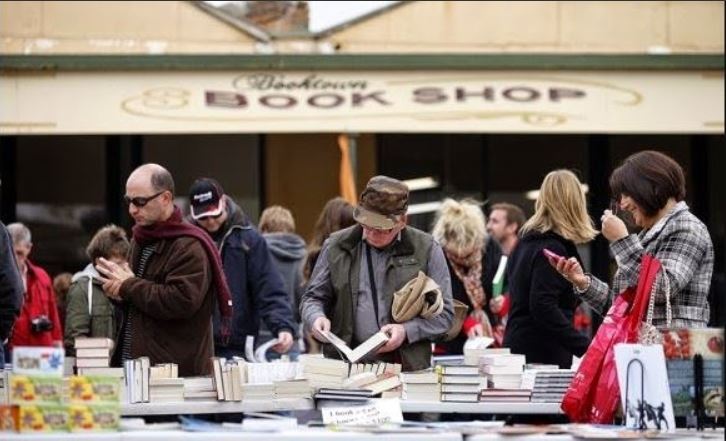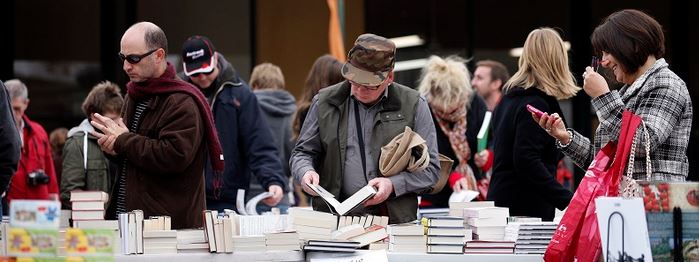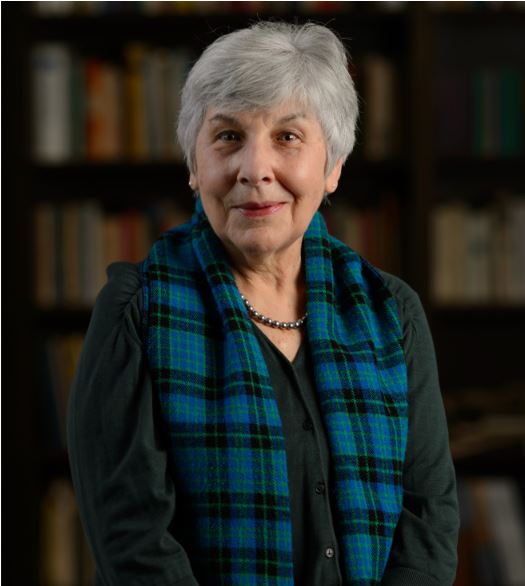October 31st, 2023Funding impact for Clunes Booktown

Organisers of Clunes Booktown say the festival will be back again next year despite earlier news that “severely reduced funding” will impact the event program.
Creative Clunes CEO Sue Beal said in a report that chairperson Kadir Hussain had “explained that due to severely reduced funding there will need to be a significantly reduced festival program for 2024”.
A public relations spokesperson said Clunes Booktown had a four-year funding agreement with Creative Victoria which ended on December 31.
Creative Clunes Inc manages the annual festival and in a community newsletter earlier this month, the organisation’s CEO Sue Beal gave a report on the Booktown AGM held last month.
“The Board will continue to seek funding for the event so they can deliver as full a program as possible,” Ms Beal said in this month’s community newsletter report.
A public relations contact for Creative Clunes had since told The Local that “Clunes Booktown has a four year funding agreement with Creative Victoria which will be coming to an end on 31 December 2023.
“Creative Clunes are in the process of applying for additional funding for future festivals.
“In the meantime, Clunes Booktown will return to Clunes on 23 & 24 March 2024…The Clunes Booktown program should be out before the end of the year.”
March 23rd, 2023Book it in! Clunes hosts book lover feast all weekend
Words: Eve Lamb.
Clunes comes to life this weekend – Saturday 25 and Sunday 26 March – as it hosts its acclaimed annual Booktown festival featuring author and artist talks, workshops and live entertainment.
The hugely successful Tough Guy Book Club will be among the 100-plus stallholders set to attract bibliophiles from far and wide as a new look Booktown will take advantage of the autumn weather with this major regional event running from dawn to dark over two days, encouraging visitors to immerse themselves in Clunes from cover to cover.

The Clunes Booktown program has been extended to look at the many and various ways we tell stories – through books, film, music, theatre, songwriting, photography and other visual arts, even the houses we make. There will be first hand stories – this year arising out of ageing, small town crime, imagining other worlds, land management, women’s business, and more.
Organisers say the festival – which has previously been held about a month later – will continue to celebrate every aspect of the book – not just writing and reading but making, illustrating, publishing, retailing, and sharing.
Along with books on display and for sale, there’ll be conversations with writers and storytellers, renowned authors, poets and wordsmiths, creating a wordy feast for weekend consumption.
And new to the Booktown program will be an evening of live music in the old Central Garage (one of the main locations in Mad Max). The corrugated iron icon will resound with music from Kee’ahn, The Idiomatics, The Footscray Gypsy Orchestra and there will be a David Bridie album launch to cap it off.
Authors and conversationalists featured in the program include Tony Birch, Aileen Morton Robinson, Jefa Greenaway, Jacinta Parsons, Ponch Hawkes, Sophie Cunningham, Miles Allinson, Emily Bitto, Emma Viskic, Vikki Petraitis, Jock Serong, Chris Flynn, Nova Wheetman, Nina Kenwood, Alice Boyle, Jan Henderson, Janice Simpson, Candice Fox, Michael Cathcart and Nathan Curnow with many more to be announced.
In addition to the author talks there will be a program of art form story crafting conversations with visual artists Simon Perry, Philip Faulks and Deborah Klein, film and TV makers Sue Maslin and Fiona Cochrane, theatre makers Bill Garner, Sue Gore and Hannie Rayson, and song-writing with David Bridie and Maylene Slater Burns.
The town’s Fraser Street will be closed to traffic between Service Street and Templeton Street from 8am on Thursday 23 March to 12pm on Monday 27 March.
March 19th, 2023Clues about Russia revealed at Clunes
AS AN adolescent, Sheila Fitzpatrick challenged her father, including questioning his view on the Soviet Union. Being a socialist, he was hopeful that it was achieving something like socialism.

Later, she went to see for herself, emerging as the most prolific and influential
historian of the Soviet Union now at work. Her 11 books and many articles guided
two generations of scholars eager to crack open the mysteries of what is now again
Russia. An engaging and warm personality, she has been studying Russia since going
from Melbourne to Oxford University as a graduate student in 1964.
The winner of many awards, she is still hard at it at 81, although she retired from
the University of Chicago (home to “the nerdiest of the nerds”) after about 20 years
and is now at the Australian Catholic University in Melbourne. She will be at Clunes
for Booktown.
We discussed the famous Winston Churchill quotation from 1939 that Russia is
a riddle, wrapped in a mystery inside an enigma. It is possibly less so now, she says.
“But when I first went into the field I felt very strongly that it is a total mystery.
Some people would say everything over there is terrible and other people say that
everything over there is great and nobody actually seemed to know very much
because, of course, the Iron Curtain was a real obstacle to the passage of people and
information.”
That changed, but she says we still don’t collectively have a very clear sense
of what Russia is all about. We do know that Russia has been worried about the
expansion of NATO towards its border, and it felt that it had been assured that this
would not happen. At the time of the break-up of the Soviet Union, its President,
Gorbachev, did get such assurances.
“I don’t see a sign of any quick ending of this terrible war,” she says. “At the
moment neither side seems to be achieving a clear military victory, therefore there’s
got to be a negotiated settlement, at some point, one assumes, but I don’t see it soon.”
An indication of her following is that her latest work, the 256-page Shortest
History of the Soviet Union has had four English editions and 10 translations,
including Ukrainian. Surprisingly, she says, there is a Russian edition. The contract
was signed just before the invasion.
As an historian she used journalistic methods to track changes in Russian power,
looking up the Moscow and St Petersburg phone directories to see what people and
organisations had been dropped. Her father, Brian Fitzpatrick, had been a journalist,
as well as helping set up the civil liberties movement in Australia, and she says she has
some of the journalist in her.
“I loved doing that. I was very happy to find that source and to work away…”
Amazingly enough, while researching a new book on displaced persons from the
Soviet Union and the Baltic, she found that a secret agent was sent to Australia by
the Soviet to try to persuade former Soviet citizens who became “displaced persons”
because of the World War II to return. This was in 1951-52 and, she says, he had a
lot of difficulty because the migrants did not want to go back. She says the agent had
many psychiatric cases on his doorstep and was kind to them.
Almost as fascinating as her work was how she came to marry. She was on a
flight from New York to Austin, Texas, in 1989, which stopped in Houston. She
had an aisle seat and invited the man next to her to stretch his legs. They fell into
conversation. His name was Mischka Danos, a Latvian who, astonishingly survived
the World War II by moving to Germany, and then to the US with his mother, who
was sponsored by one of the Jewish people she saved.
He and Professor Fitzpatrick talked on that flight. They spoke in Russian. “He
suddenly stopped, explaining later that this was because he had a conflict about which
version of ‘you’ to use: the familiar, which felt natural but impolite given our very
recent acquaintance, or the polite one, which felt wrong because of his feeling that he
was talking to someone he knew well.” They were together until his death 10 years
later.
Away from academia, Professor Fitzpatrick played violin in chamber music groups.
And then there are her three passports. On entering or leaving this country
she uses her Australian one. Earlier, she automatically lost this by getting a British
passport so she could enter the Soviet Union. This was in her newly-acquired married
name, but she published under her maiden name, which helped because her first
scholarly article as S. Fitzpatrick (presumably male) was denounced as anti-Soviet
propaganda by a Moscow daily paper but nothing happened to her. Then she got an
American passport and now has an Australian one as well, so she can certainly travel…
Professor Fitzpatrick will appear with fellow historian Professor Joy Damousi
talking about Russia’s Soviet past at a sold-out event at Clunes Courthouse at
1.30pm on Saturday, March 25.
Words: Kevin Childs | Image: Contributed






